
The goal of daughter-dependency theory is the same as that of Chomskyan transformational grammar—to generate syntactic structures for all (and only) syntactically well-formed sentences that would relate to both the phonological and the semantic structures of the sentences. However, unlike transformational grammars, those based on daughter-dependency theory generate a single syntactic structure for each sentence. This structure incorporates all the kinds of information that are spread, in a transformational grammar, over to a series of structures (deep, surface, and intermediate). Instead of the combination of phrase-structure rules and transformations found in transformational grammars, daughter-dependency grammars contain rules with the following functions: classification, dependency-marking, or ordering.
Hudson's strong arguments for a non-transformational grammar stress the capacity of daughter-dependency theory to reflect the facts of language structure and to capture generalizations that transformational models miss. An important attraction of Hudson's theory is that the syntax is more concrete, with no abstract underlying elements.
In the appendixes, the author outlines a partial grammar for English and a small lexicon and distinguishes his theory from standard dependency theory. Hudson's provocative thesis is supported by his thorough knowledge of transformational grammar.
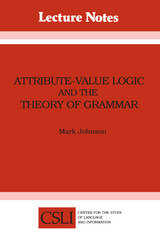
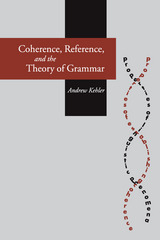
In this book, Andrew Kehler provides an analysis of coherence relationships between utterances that is rooted in three types of 'connection among ideas' first articulated by the philosopher David Hume—Resemblance, Cause or Effect, and Contiguity. Kehler then shows how these relationships affect the distribution of a variety of linguistic phenomena, including verb phrase ellipsis, gapping, extraction from coordinate structures, tense, and pronominal reference. In each of these areas, Kehler demonstrates how the constraints imposed by linguistic form interact with those imposed by the process of establishing coherence to explain data that has eluded previous analyses. his book will be of interest to researchers from the broad spectrum of disciplines from which discourse is studied, as well as those working in syntax, semantics, computational linguistics, psycholinguistics, and philosophy of language.
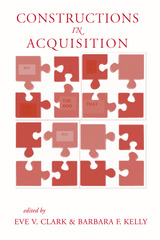

Pritchett critiques the major performance-based parsing models to argue that the principles of grammar drive the parser; the parser, furthermore, is the apparatus that tries to enforce the conditions of the grammar at every point in the processing of a sentence. In comparing garden path phenomena, those instances when the parser fails on the first reading of a sentence and must reanalyze it, with occasions when the parser successfully functions the first time around, Pritchett makes a convincing case for a grammar-derived parsing theory.
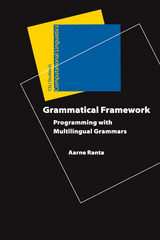
Grammatical Framework is a programming language designed for writing grammars, which has the capability of addressing several languages in parallel. This thorough introduction demonstrates how to write grammars in Grammatical Framework and use them in applications such as tourist phrasebooks, spoken dialogue systems, and natural language interfaces. The examples and exercises presented here address several languages, and the readers are shown how to look at their own languages from the computational perspective.
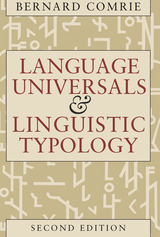
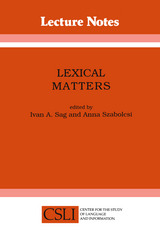
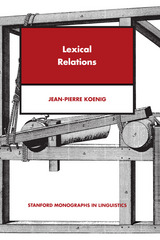
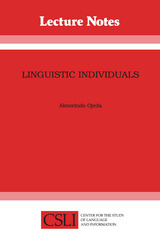
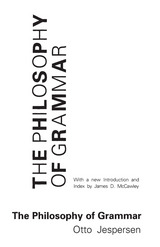
University in 1909-10, called “An Introduction to English Grammar.”
It is the connected presentation of Jespersen's views of the general
principles of grammar based on years of studying various languages
through both direct observation of living speech and written and
printed documents.
“[The Philosophy of Grammar and Analytic Syntax] set
forth the most extensive and original theory of universal grammar
prior to the work of Chomsky and other generative grammarians of the
last thirty years.”—Arne Juul and Hans F. Nielsen, in Otto
Jespersen: Facets of His Life and Work
“Besides being one of the most perceptive observers and original
thinkers that the field of linguistics has ever known, Jespersen was
also one of its most entertaining writers, and reading The
Philosophy of Grammar is fun. Read it, enjoy it.”—James D.
McCawley, from the Introduction
Otto Jespersen (1860-1943), an authority on the growth and structure
of language, was the Chair of the English Department at the University
of Copenhagen. Among his many works are A Modern English
Grammar and Analytic Syntax, the latter published by the
University of Chicago Press.
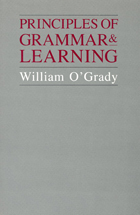
To support this thesis, O'Grady develops a well-articulated, single level, categorial-type grammar that he uses to analyze syntactic categories, extraction, anaphora, extraposition, and quantifier placement in English and other languages. He shows that such grammars can be constructed via general learning strategies from notions such as dependency, adjacency, precedence, and continuity, and that the available acquisition data points to the emergence of the principles he proposes.
While exploratory, this book provides one of the few serious attempts to develop a theory of grammar and learning that does not posit faculty-specific innate principles. Principles of Grammar and Learning is an exemplary attempt to bring together issues and data from syntactic theory, language acquisition, and the more general study of the human mind.
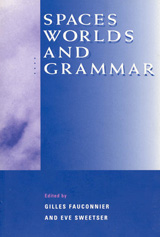
These twelve original papers extend the mental-spaces framework and demonstrate its utility in solving deep problems in linguistics and discourse theory. Investigating the ties between mental constructs, they analyze a wide range of phenomena, including analogical counterfactuals; the metaphor system for conceptualizing the self; abstract change expressions in Japanese; mood in Spanish; deictic expressions; copular sentences in Japanese; conditional constructions; and reference in American Sign Language.
The ground-breaking research presented in this volume will be of interest to linguists and cognitive scientists.
The contributors are Claudia Brugman, Gilles Fauconnier, George Lakoff, Yo Matsumoto, Errapel Mejias-Bikandi, Laura A. Michaelis, Gisela Redeker, Jo Rubba, Shigeru Sakahara, Jose Sanders, Eve Sweetser, and Karen van Hoek.
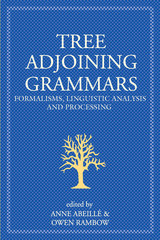

Following an extensive historical overview of theories about universal grammar, Herman examines Joyce’s Ulysses, Kafka’s The Trial, and Woolf’s Between the Acts as case studies of modernist literary narratives that encode grammatical principles which were (re)fashioned in logic, linguistics, and philosophy during the same period. Herman then uses the interpretation of universal grammar developed via these modernist texts to explore later twentieth-century cultural phenomena. The problem of citation in the discourses of postmodernism, for example, is discussed with reference to syntactic theory. An analysis of Peter Greenaway’s The Cook, The Thief, His Wife, and Her Lover raises the question of cinematic meaning and draws on semantic theory. In each case, Herman shows how postmodern narratives encode ideas at work in current theories about the nature and function of language.
Outlining new directions for the study of language in literature, Universal Grammar and Narrative Form provides a wealth of information about key literary, linguistic, and philosophical trends in the twentieth century.
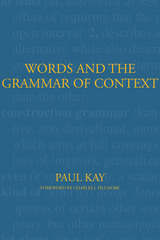
READERS
Browse our collection.
PUBLISHERS
See BiblioVault's publisher services.
STUDENT SERVICES
Files for college accessibility offices.
UChicago Accessibility Resources
home | accessibility | search | about | contact us
BiblioVault ® 2001 - 2024
The University of Chicago Press









